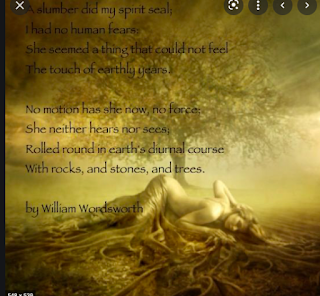- Get link
- X
- Other Apps
- Get link
- X
- Other Apps
ABOUT THE POET
William Wordsworth, (born April 7, 1770, —died April 23, 1850), English poet whose Lyrical Ballads (1798), written with Samuel Taylor Coleridge, helped launch the English Romantic movement. A slumber did my spirit seal" is a poem written in 1798 and published in the 1800 edition of Lyrical Ballads. It is usually included as one of his The Lucy poems, although it is the only poem of the series not to mention her name. The poem is a mere eight lines long; two "stanzas." This is an epitaph. A short poem intended for (or imagined as) an inscription on a tombstone and often serving as a brief elegy. An elegy is a poem that reflects upon death or loss.
STANZA 1
A slumber did my spirit seal—
I had no human fears.
She seemed a thing that could not feel
The touch of earthy years.
STANZA 2
No motion has she now, no force—
She neither hears nor sees,
Rolled round in earth’s diurnal course
With rocks and stones and trees.
diurnal: daily (“Earth’s diurnal course” is earth’s daily rotation on its axis.)
1. “A slumber did my spirit seal,” says the poet. That is, a deep sleep ‘ closed off’ his soul (or mind). How does the poet react to his loved one’s death? Does he feel bitter grief? Or does he feel a great peace?
2. The passing of time will no longer affect her, says the poet. Which lines of the poem say this?
‘She seemed a thing that could not feel
The touch of earthy years.’
No motion has she now, no force—
She neither hears nor sees,
Rolled round in earth’s diurnal course
With rocks and stones and trees.
diurnal: daily (“Earth’s diurnal course” is earth’s daily rotation on its axis.)
1. “A slumber did my spirit seal,” says the poet. That is, a deep sleep ‘ closed off’ his soul (or mind). How does the poet react to his loved one’s death? Does he feel bitter grief? Or does he feel a great peace?
He does not feel bitter grief that he could shed out in the form of tears. He just looked at her and wondered how she looked and what she would experience later. He did not feel any fear. Instead, he feels a sense of peace as he has realised that after death she has become a part of nature. She is now beyond the life’s trials.
2. The passing of time will no longer affect her, says the poet. Which lines of the poem say this?
‘She seemed a thing that could not feel
The touch of earthy years.’
These two lines indicate that the poet says that the passing of time will no longer affect her.
3. How does the poet imagine her to be, after death? Does he think of her as a person living in a very happy state (a ‘heaven’)? Or does he see her now as a part of nature? In which lines of the poem do you find your answer?
4. This poem is about the death of a loved one. How does the poet feel when he thinks about her death? How does he imagine her to be, after death?
3. How does the poet imagine her to be, after death? Does he think of her as a person living in a very happy state (a ‘heaven’)? Or does he see her now as a part of nature? In which lines of the poem do you find your answer?
No, the poet does not think of her living in ‘heaven’ after her death. Instead, he thinks that after being buried in the earth, she has become a part of nature and is moving around with the earth in its daily rotation like the rocks, stones and trees. The last two lines in the poem “Rolled round in earth’s diurnal course ---With rocks and stones and trees. “ says that she has now part of nature.
4. This poem is about the death of a loved one. How does the poet feel when he thinks about her death? How does he imagine her to be, after death?
The poet imagines his beloved to be immortal even after death because he can sense her presence in the earth’s nature. He feels that she is travelling round in earth’s diurnal course and goes on revolving with the rocks, stones and the trees.

Comments
Post a Comment